Intercultural Management in Business: A Case Study Analysis
VerifiedAdded on 2023/06/15
|11
|2712
|251
Case Study
AI Summary
This case study analyzes the intercultural management challenges faced by Stefan Phillips, a U.S. Airlines manager transferred to Dhahran, Saudi Arabia. Stefan struggles to adapt to the local culture, particularly the communication style and work ethic of Saudi employees. The analysis identifies Stefan's shortcomings, including a lack of cultural understanding and ineffective communication. The report suggests strategies for improvement, such as cross-cultural training, adopting Belbin's team cohesion theory to build effective teams, and embracing a leadership approach that values local customs and conflict management techniques. Ultimately, the advice aims to help Stefan navigate cultural differences, foster better relationships with his Saudi team, and achieve success in his new role. Desklib provides students with access to solved assignments and past papers for similar case studies.
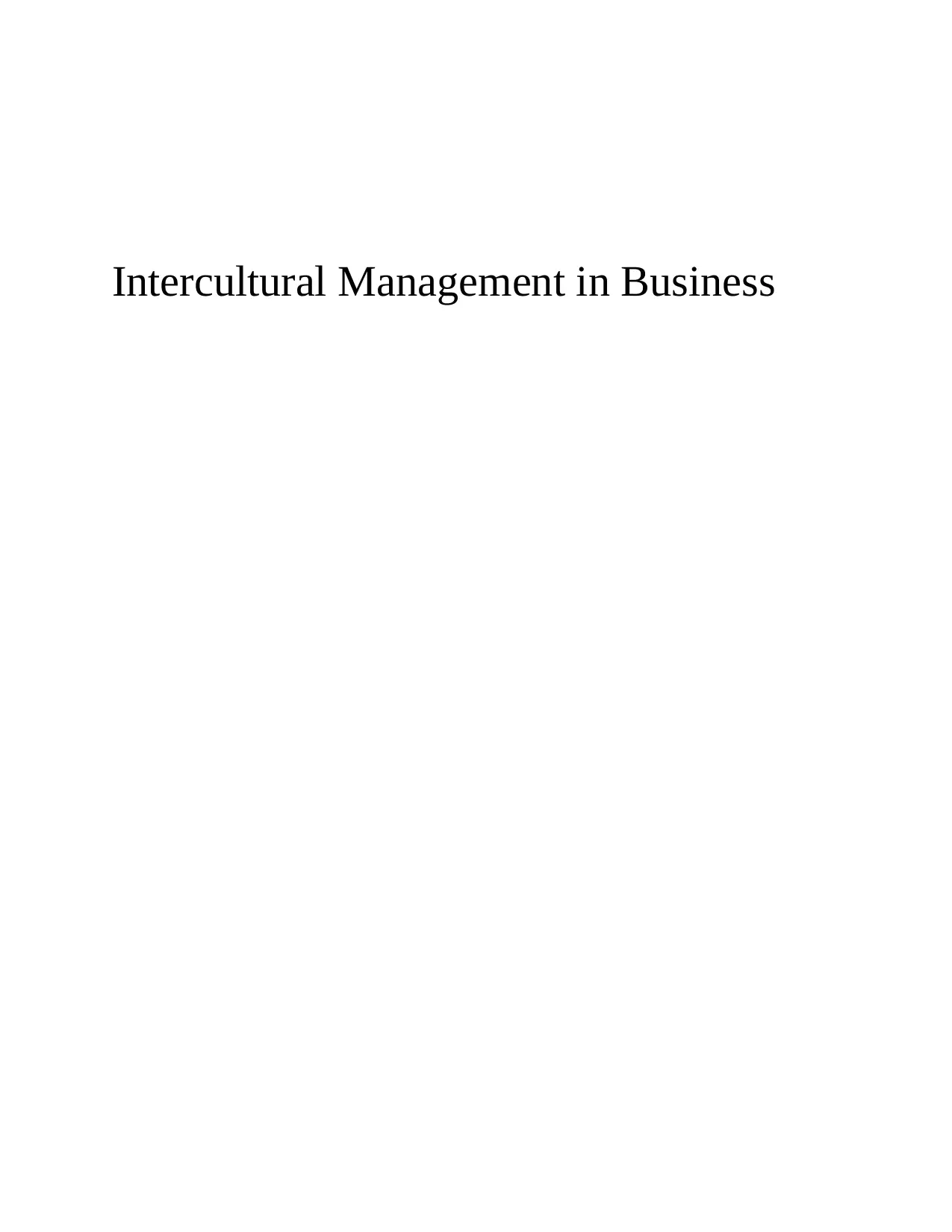
Intercultural Management in Business
Paraphrase This Document
Need a fresh take? Get an instant paraphrase of this document with our AI Paraphraser
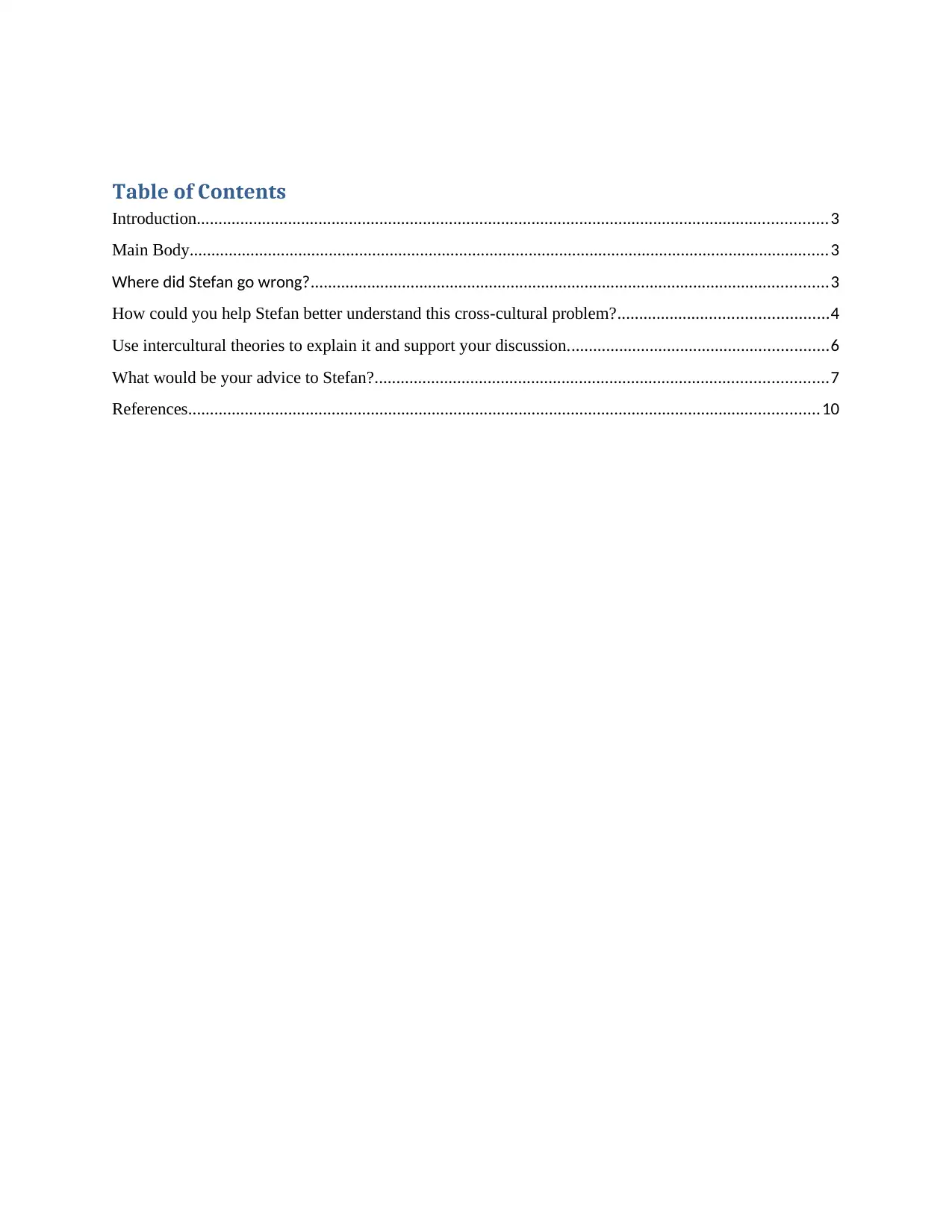
Table of Contents
Introduction.................................................................................................................................................3
Main Body...................................................................................................................................................3
Where did Stefan go wrong?.......................................................................................................................3
How could you help Stefan better understand this cross-cultural problem?................................................4
Use intercultural theories to explain it and support your discussion............................................................6
What would be your advice to Stefan?........................................................................................................7
References.................................................................................................................................................10
Introduction.................................................................................................................................................3
Main Body...................................................................................................................................................3
Where did Stefan go wrong?.......................................................................................................................3
How could you help Stefan better understand this cross-cultural problem?................................................4
Use intercultural theories to explain it and support your discussion............................................................6
What would be your advice to Stefan?........................................................................................................7
References.................................................................................................................................................10
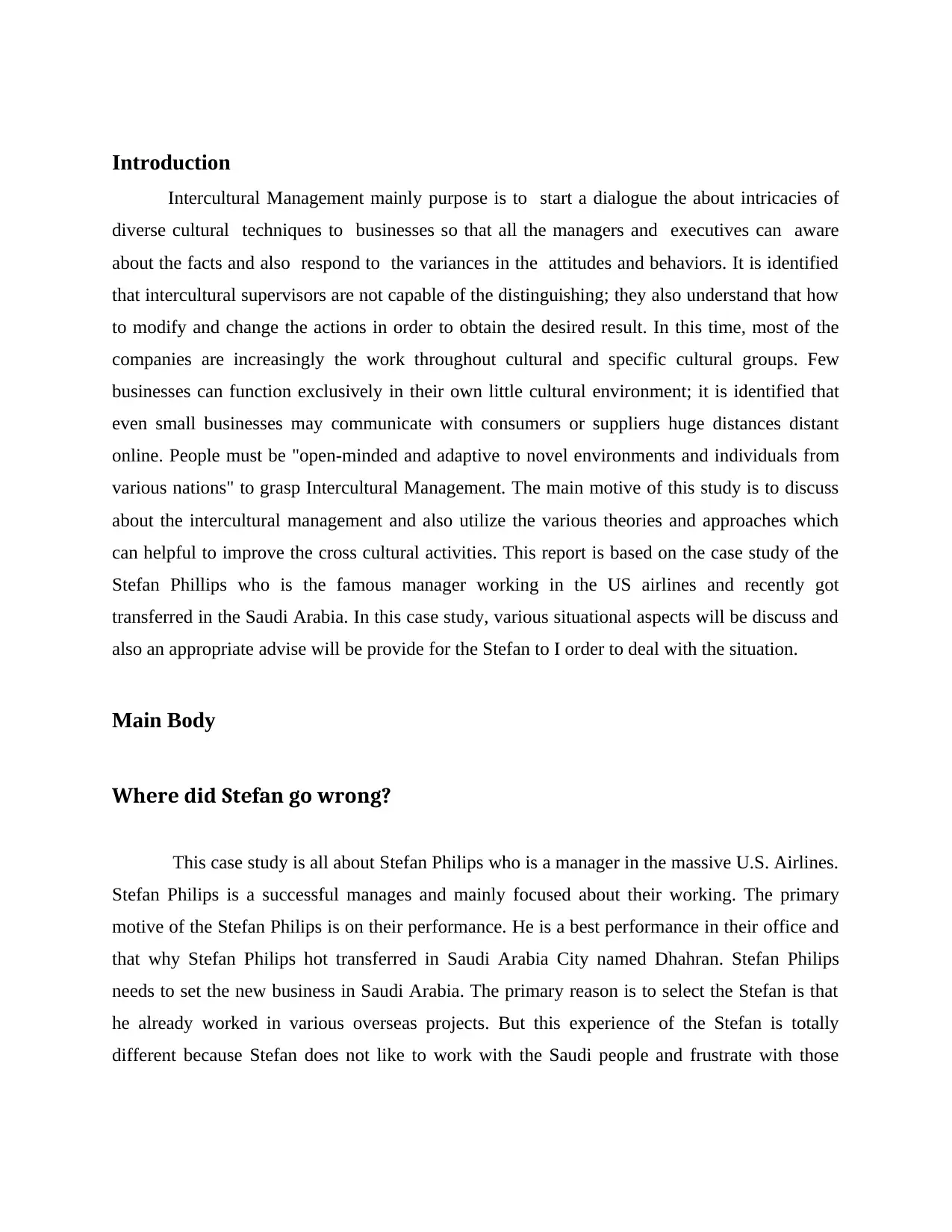
Introduction
Intercultural Management mainly purpose is to start a dialogue the about intricacies of
diverse cultural techniques to businesses so that all the managers and executives can aware
about the facts and also respond to the variances in the attitudes and behaviors. It is identified
that intercultural supervisors are not capable of the distinguishing; they also understand that how
to modify and change the actions in order to obtain the desired result. In this time, most of the
companies are increasingly the work throughout cultural and specific cultural groups. Few
businesses can function exclusively in their own little cultural environment; it is identified that
even small businesses may communicate with consumers or suppliers huge distances distant
online. People must be "open-minded and adaptive to novel environments and individuals from
various nations" to grasp Intercultural Management. The main motive of this study is to discuss
about the intercultural management and also utilize the various theories and approaches which
can helpful to improve the cross cultural activities. This report is based on the case study of the
Stefan Phillips who is the famous manager working in the US airlines and recently got
transferred in the Saudi Arabia. In this case study, various situational aspects will be discuss and
also an appropriate advise will be provide for the Stefan to I order to deal with the situation.
Main Body
Where did Stefan go wrong?
This case study is all about Stefan Philips who is a manager in the massive U.S. Airlines.
Stefan Philips is a successful manages and mainly focused about their working. The primary
motive of the Stefan Philips is on their performance. He is a best performance in their office and
that why Stefan Philips hot transferred in Saudi Arabia City named Dhahran. Stefan Philips
needs to set the new business in Saudi Arabia. The primary reason is to select the Stefan is that
he already worked in various overseas projects. But this experience of the Stefan is totally
different because Stefan does not like to work with the Saudi people and frustrate with those
Intercultural Management mainly purpose is to start a dialogue the about intricacies of
diverse cultural techniques to businesses so that all the managers and executives can aware
about the facts and also respond to the variances in the attitudes and behaviors. It is identified
that intercultural supervisors are not capable of the distinguishing; they also understand that how
to modify and change the actions in order to obtain the desired result. In this time, most of the
companies are increasingly the work throughout cultural and specific cultural groups. Few
businesses can function exclusively in their own little cultural environment; it is identified that
even small businesses may communicate with consumers or suppliers huge distances distant
online. People must be "open-minded and adaptive to novel environments and individuals from
various nations" to grasp Intercultural Management. The main motive of this study is to discuss
about the intercultural management and also utilize the various theories and approaches which
can helpful to improve the cross cultural activities. This report is based on the case study of the
Stefan Phillips who is the famous manager working in the US airlines and recently got
transferred in the Saudi Arabia. In this case study, various situational aspects will be discuss and
also an appropriate advise will be provide for the Stefan to I order to deal with the situation.
Main Body
Where did Stefan go wrong?
This case study is all about Stefan Philips who is a manager in the massive U.S. Airlines.
Stefan Philips is a successful manages and mainly focused about their working. The primary
motive of the Stefan Philips is on their performance. He is a best performance in their office and
that why Stefan Philips hot transferred in Saudi Arabia City named Dhahran. Stefan Philips
needs to set the new business in Saudi Arabia. The primary reason is to select the Stefan is that
he already worked in various overseas projects. But this experience of the Stefan is totally
different because Stefan does not like to work with the Saudi people and frustrate with those
⊘ This is a preview!⊘
Do you want full access?
Subscribe today to unlock all pages.

Trusted by 1+ million students worldwide
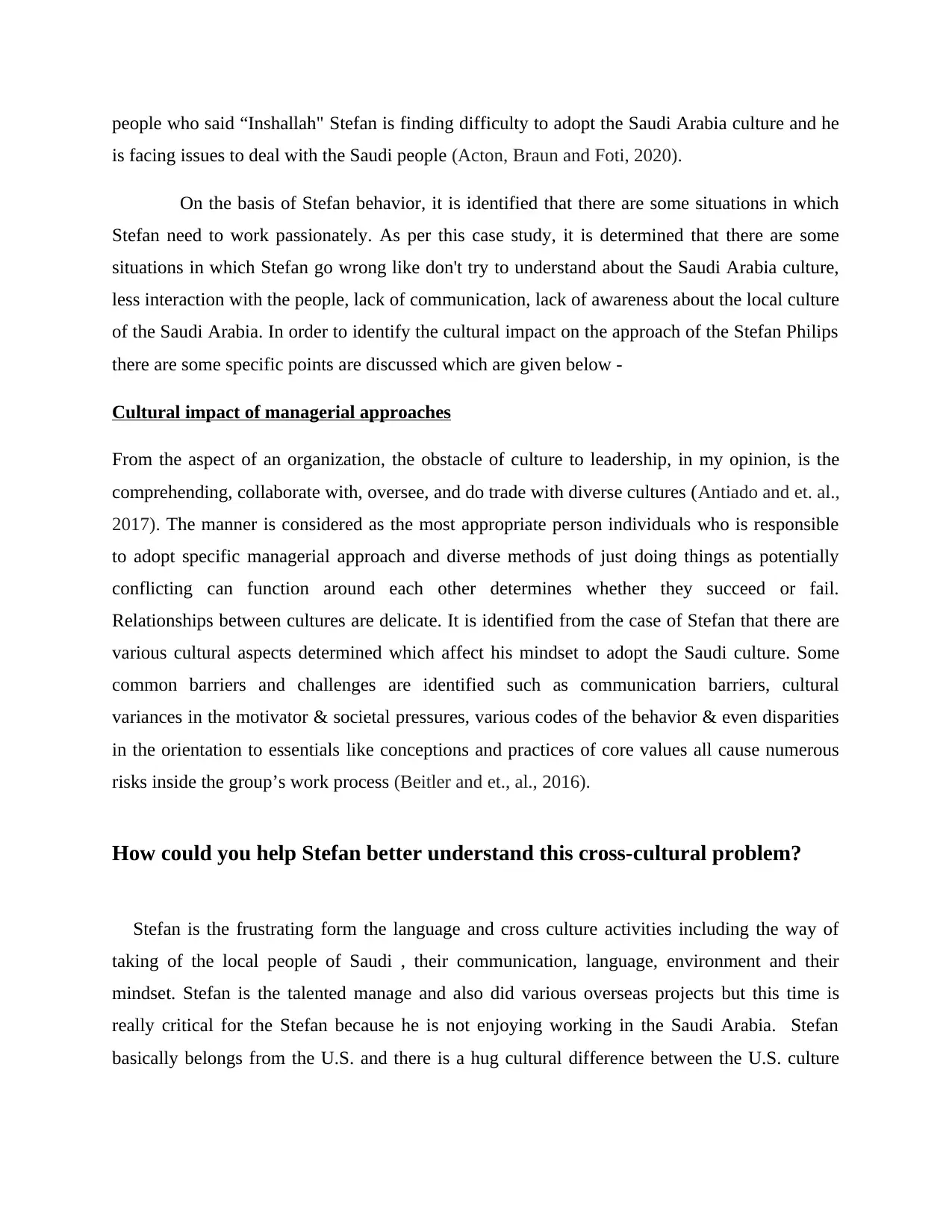
people who said “Inshallah" Stefan is finding difficulty to adopt the Saudi Arabia culture and he
is facing issues to deal with the Saudi people (Acton, Braun and Foti, 2020).
On the basis of Stefan behavior, it is identified that there are some situations in which
Stefan need to work passionately. As per this case study, it is determined that there are some
situations in which Stefan go wrong like don't try to understand about the Saudi Arabia culture,
less interaction with the people, lack of communication, lack of awareness about the local culture
of the Saudi Arabia. In order to identify the cultural impact on the approach of the Stefan Philips
there are some specific points are discussed which are given below -
Cultural impact of managerial approaches
From the aspect of an organization, the obstacle of culture to leadership, in my opinion, is the
comprehending, collaborate with, oversee, and do trade with diverse cultures (Antiado and et. al.,
2017). The manner is considered as the most appropriate person individuals who is responsible
to adopt specific managerial approach and diverse methods of just doing things as potentially
conflicting can function around each other determines whether they succeed or fail.
Relationships between cultures are delicate. It is identified from the case of Stefan that there are
various cultural aspects determined which affect his mindset to adopt the Saudi culture. Some
common barriers and challenges are identified such as communication barriers, cultural
variances in the motivator & societal pressures, various codes of the behavior & even disparities
in the orientation to essentials like conceptions and practices of core values all cause numerous
risks inside the group’s work process (Beitler and et., al., 2016).
How could you help Stefan better understand this cross-cultural problem?
Stefan is the frustrating form the language and cross culture activities including the way of
taking of the local people of Saudi , their communication, language, environment and their
mindset. Stefan is the talented manage and also did various overseas projects but this time is
really critical for the Stefan because he is not enjoying working in the Saudi Arabia. Stefan
basically belongs from the U.S. and there is a hug cultural difference between the U.S. culture
is facing issues to deal with the Saudi people (Acton, Braun and Foti, 2020).
On the basis of Stefan behavior, it is identified that there are some situations in which
Stefan need to work passionately. As per this case study, it is determined that there are some
situations in which Stefan go wrong like don't try to understand about the Saudi Arabia culture,
less interaction with the people, lack of communication, lack of awareness about the local culture
of the Saudi Arabia. In order to identify the cultural impact on the approach of the Stefan Philips
there are some specific points are discussed which are given below -
Cultural impact of managerial approaches
From the aspect of an organization, the obstacle of culture to leadership, in my opinion, is the
comprehending, collaborate with, oversee, and do trade with diverse cultures (Antiado and et. al.,
2017). The manner is considered as the most appropriate person individuals who is responsible
to adopt specific managerial approach and diverse methods of just doing things as potentially
conflicting can function around each other determines whether they succeed or fail.
Relationships between cultures are delicate. It is identified from the case of Stefan that there are
various cultural aspects determined which affect his mindset to adopt the Saudi culture. Some
common barriers and challenges are identified such as communication barriers, cultural
variances in the motivator & societal pressures, various codes of the behavior & even disparities
in the orientation to essentials like conceptions and practices of core values all cause numerous
risks inside the group’s work process (Beitler and et., al., 2016).
How could you help Stefan better understand this cross-cultural problem?
Stefan is the frustrating form the language and cross culture activities including the way of
taking of the local people of Saudi , their communication, language, environment and their
mindset. Stefan is the talented manage and also did various overseas projects but this time is
really critical for the Stefan because he is not enjoying working in the Saudi Arabia. Stefan
basically belongs from the U.S. and there is a hug cultural difference between the U.S. culture
Paraphrase This Document
Need a fresh take? Get an instant paraphrase of this document with our AI Paraphraser
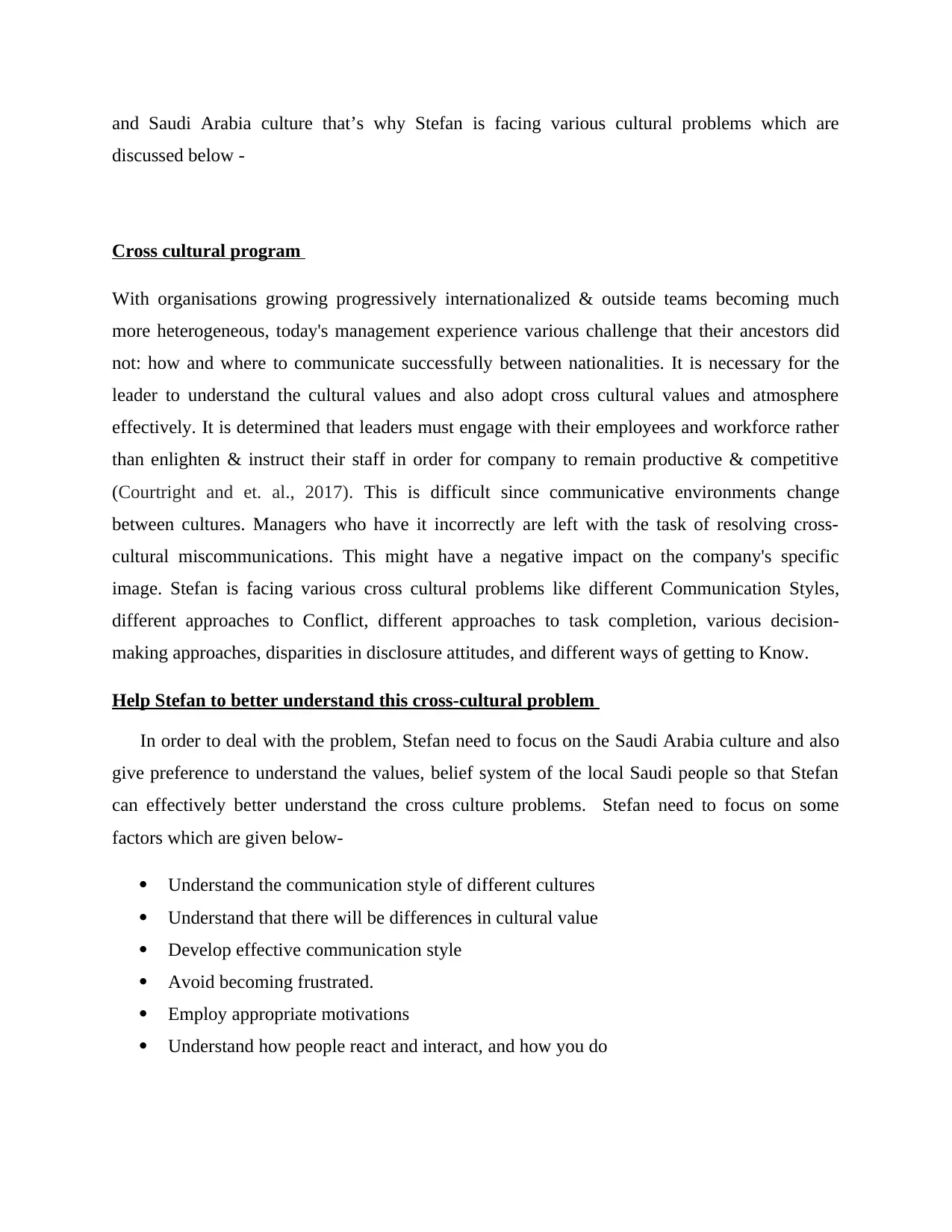
and Saudi Arabia culture that’s why Stefan is facing various cultural problems which are
discussed below -
Cross cultural program
With organisations growing progressively internationalized & outside teams becoming much
more heterogeneous, today's management experience various challenge that their ancestors did
not: how and where to communicate successfully between nationalities. It is necessary for the
leader to understand the cultural values and also adopt cross cultural values and atmosphere
effectively. It is determined that leaders must engage with their employees and workforce rather
than enlighten & instruct their staff in order for company to remain productive & competitive
(Courtright and et. al., 2017). This is difficult since communicative environments change
between cultures. Managers who have it incorrectly are left with the task of resolving cross-
cultural miscommunications. This might have a negative impact on the company's specific
image. Stefan is facing various cross cultural problems like different Communication Styles,
different approaches to Conflict, different approaches to task completion, various decision-
making approaches, disparities in disclosure attitudes, and different ways of getting to Know.
Help Stefan to better understand this cross-cultural problem
In order to deal with the problem, Stefan need to focus on the Saudi Arabia culture and also
give preference to understand the values, belief system of the local Saudi people so that Stefan
can effectively better understand the cross culture problems. Stefan need to focus on some
factors which are given below-
Understand the communication style of different cultures
Understand that there will be differences in cultural value
Develop effective communication style
Avoid becoming frustrated.
Employ appropriate motivations
Understand how people react and interact, and how you do
discussed below -
Cross cultural program
With organisations growing progressively internationalized & outside teams becoming much
more heterogeneous, today's management experience various challenge that their ancestors did
not: how and where to communicate successfully between nationalities. It is necessary for the
leader to understand the cultural values and also adopt cross cultural values and atmosphere
effectively. It is determined that leaders must engage with their employees and workforce rather
than enlighten & instruct their staff in order for company to remain productive & competitive
(Courtright and et. al., 2017). This is difficult since communicative environments change
between cultures. Managers who have it incorrectly are left with the task of resolving cross-
cultural miscommunications. This might have a negative impact on the company's specific
image. Stefan is facing various cross cultural problems like different Communication Styles,
different approaches to Conflict, different approaches to task completion, various decision-
making approaches, disparities in disclosure attitudes, and different ways of getting to Know.
Help Stefan to better understand this cross-cultural problem
In order to deal with the problem, Stefan need to focus on the Saudi Arabia culture and also
give preference to understand the values, belief system of the local Saudi people so that Stefan
can effectively better understand the cross culture problems. Stefan need to focus on some
factors which are given below-
Understand the communication style of different cultures
Understand that there will be differences in cultural value
Develop effective communication style
Avoid becoming frustrated.
Employ appropriate motivations
Understand how people react and interact, and how you do
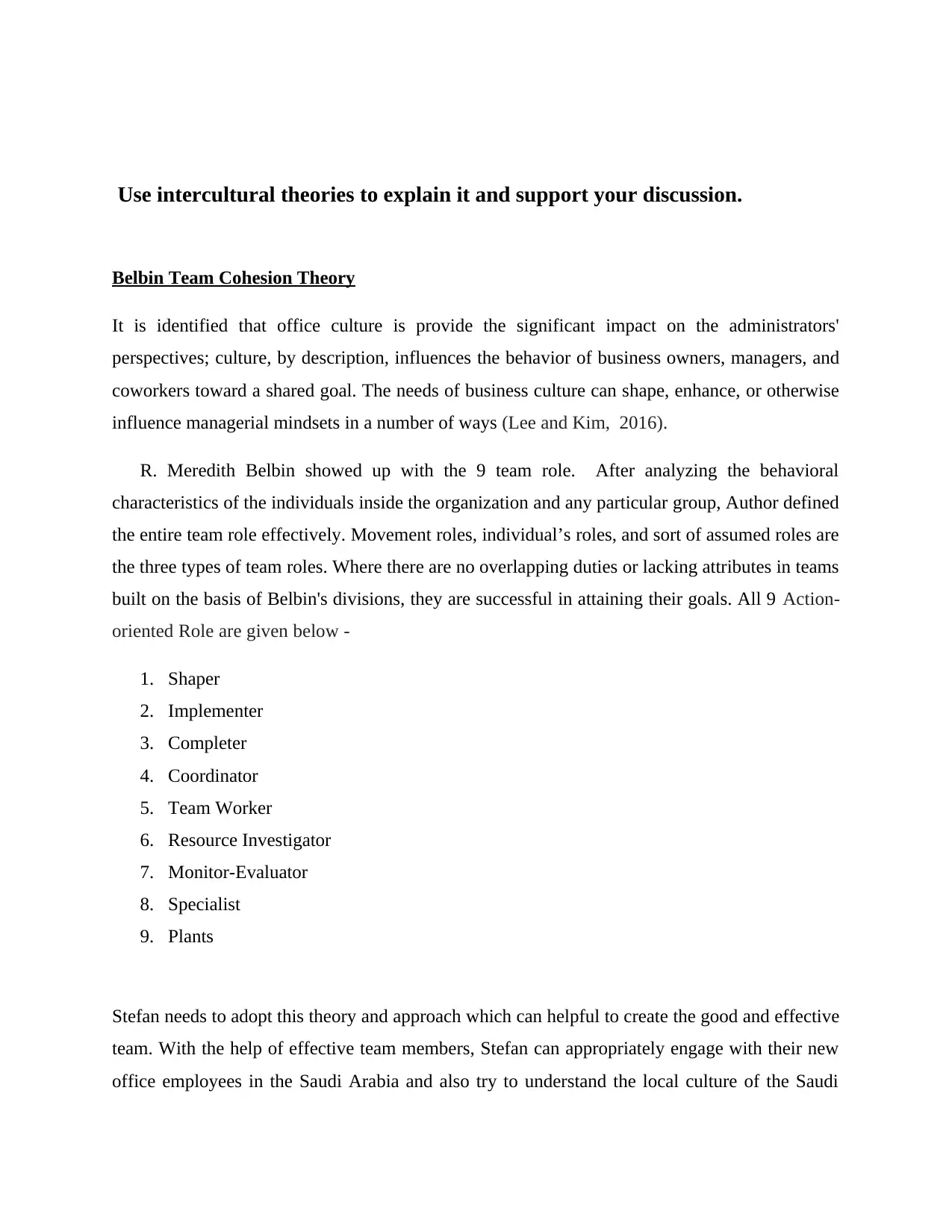
Use intercultural theories to explain it and support your discussion.
Belbin Team Cohesion Theory
It is identified that office culture is provide the significant impact on the administrators'
perspectives; culture, by description, influences the behavior of business owners, managers, and
coworkers toward a shared goal. The needs of business culture can shape, enhance, or otherwise
influence managerial mindsets in a number of ways (Lee and Kim, 2016).
R. Meredith Belbin showed up with the 9 team role. After analyzing the behavioral
characteristics of the individuals inside the organization and any particular group, Author defined
the entire team role effectively. Movement roles, individual’s roles, and sort of assumed roles are
the three types of team roles. Where there are no overlapping duties or lacking attributes in teams
built on the basis of Belbin's divisions, they are successful in attaining their goals. All 9 Action-
oriented Role are given below -
1. Shaper
2. Implementer
3. Completer
4. Coordinator
5. Team Worker
6. Resource Investigator
7. Monitor-Evaluator
8. Specialist
9. Plants
Stefan needs to adopt this theory and approach which can helpful to create the good and effective
team. With the help of effective team members, Stefan can appropriately engage with their new
office employees in the Saudi Arabia and also try to understand the local culture of the Saudi
Belbin Team Cohesion Theory
It is identified that office culture is provide the significant impact on the administrators'
perspectives; culture, by description, influences the behavior of business owners, managers, and
coworkers toward a shared goal. The needs of business culture can shape, enhance, or otherwise
influence managerial mindsets in a number of ways (Lee and Kim, 2016).
R. Meredith Belbin showed up with the 9 team role. After analyzing the behavioral
characteristics of the individuals inside the organization and any particular group, Author defined
the entire team role effectively. Movement roles, individual’s roles, and sort of assumed roles are
the three types of team roles. Where there are no overlapping duties or lacking attributes in teams
built on the basis of Belbin's divisions, they are successful in attaining their goals. All 9 Action-
oriented Role are given below -
1. Shaper
2. Implementer
3. Completer
4. Coordinator
5. Team Worker
6. Resource Investigator
7. Monitor-Evaluator
8. Specialist
9. Plants
Stefan needs to adopt this theory and approach which can helpful to create the good and effective
team. With the help of effective team members, Stefan can appropriately engage with their new
office employees in the Saudi Arabia and also try to understand the local culture of the Saudi
⊘ This is a preview!⊘
Do you want full access?
Subscribe today to unlock all pages.

Trusted by 1+ million students worldwide
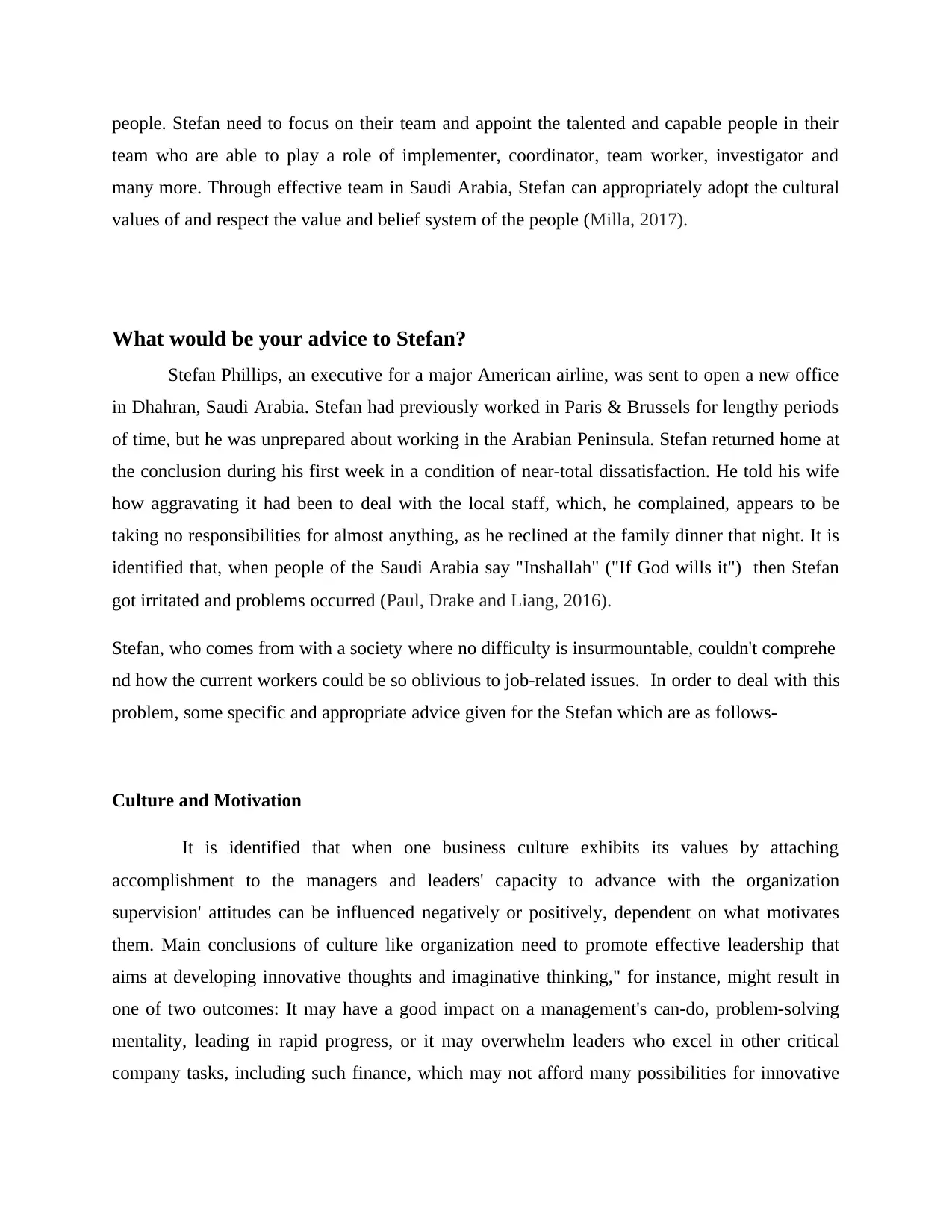
people. Stefan need to focus on their team and appoint the talented and capable people in their
team who are able to play a role of implementer, coordinator, team worker, investigator and
many more. Through effective team in Saudi Arabia, Stefan can appropriately adopt the cultural
values of and respect the value and belief system of the people (Milla, 2017).
What would be your advice to Stefan?
Stefan Phillips, an executive for a major American airline, was sent to open a new office
in Dhahran, Saudi Arabia. Stefan had previously worked in Paris & Brussels for lengthy periods
of time, but he was unprepared about working in the Arabian Peninsula. Stefan returned home at
the conclusion during his first week in a condition of near-total dissatisfaction. He told his wife
how aggravating it had been to deal with the local staff, which, he complained, appears to be
taking no responsibilities for almost anything, as he reclined at the family dinner that night. It is
identified that, when people of the Saudi Arabia say "Inshallah" ("If God wills it") then Stefan
got irritated and problems occurred (Paul, Drake and Liang, 2016).
Stefan, who comes from with a society where no difficulty is insurmountable, couldn't comprehe
nd how the current workers could be so oblivious to job-related issues. In order to deal with this
problem, some specific and appropriate advice given for the Stefan which are as follows-
Culture and Motivation
It is identified that when one business culture exhibits its values by attaching
accomplishment to the managers and leaders' capacity to advance with the organization
supervision' attitudes can be influenced negatively or positively, dependent on what motivates
them. Main conclusions of culture like organization need to promote effective leadership that
aims at developing innovative thoughts and imaginative thinking," for instance, might result in
one of two outcomes: It may have a good impact on a management's can-do, problem-solving
mentality, leading in rapid progress, or it may overwhelm leaders who excel in other critical
company tasks, including such finance, which may not afford many possibilities for innovative
team who are able to play a role of implementer, coordinator, team worker, investigator and
many more. Through effective team in Saudi Arabia, Stefan can appropriately adopt the cultural
values of and respect the value and belief system of the people (Milla, 2017).
What would be your advice to Stefan?
Stefan Phillips, an executive for a major American airline, was sent to open a new office
in Dhahran, Saudi Arabia. Stefan had previously worked in Paris & Brussels for lengthy periods
of time, but he was unprepared about working in the Arabian Peninsula. Stefan returned home at
the conclusion during his first week in a condition of near-total dissatisfaction. He told his wife
how aggravating it had been to deal with the local staff, which, he complained, appears to be
taking no responsibilities for almost anything, as he reclined at the family dinner that night. It is
identified that, when people of the Saudi Arabia say "Inshallah" ("If God wills it") then Stefan
got irritated and problems occurred (Paul, Drake and Liang, 2016).
Stefan, who comes from with a society where no difficulty is insurmountable, couldn't comprehe
nd how the current workers could be so oblivious to job-related issues. In order to deal with this
problem, some specific and appropriate advice given for the Stefan which are as follows-
Culture and Motivation
It is identified that when one business culture exhibits its values by attaching
accomplishment to the managers and leaders' capacity to advance with the organization
supervision' attitudes can be influenced negatively or positively, dependent on what motivates
them. Main conclusions of culture like organization need to promote effective leadership that
aims at developing innovative thoughts and imaginative thinking," for instance, might result in
one of two outcomes: It may have a good impact on a management's can-do, problem-solving
mentality, leading in rapid progress, or it may overwhelm leaders who excel in other critical
company tasks, including such finance, which may not afford many possibilities for innovative
Paraphrase This Document
Need a fresh take? Get an instant paraphrase of this document with our AI Paraphraser
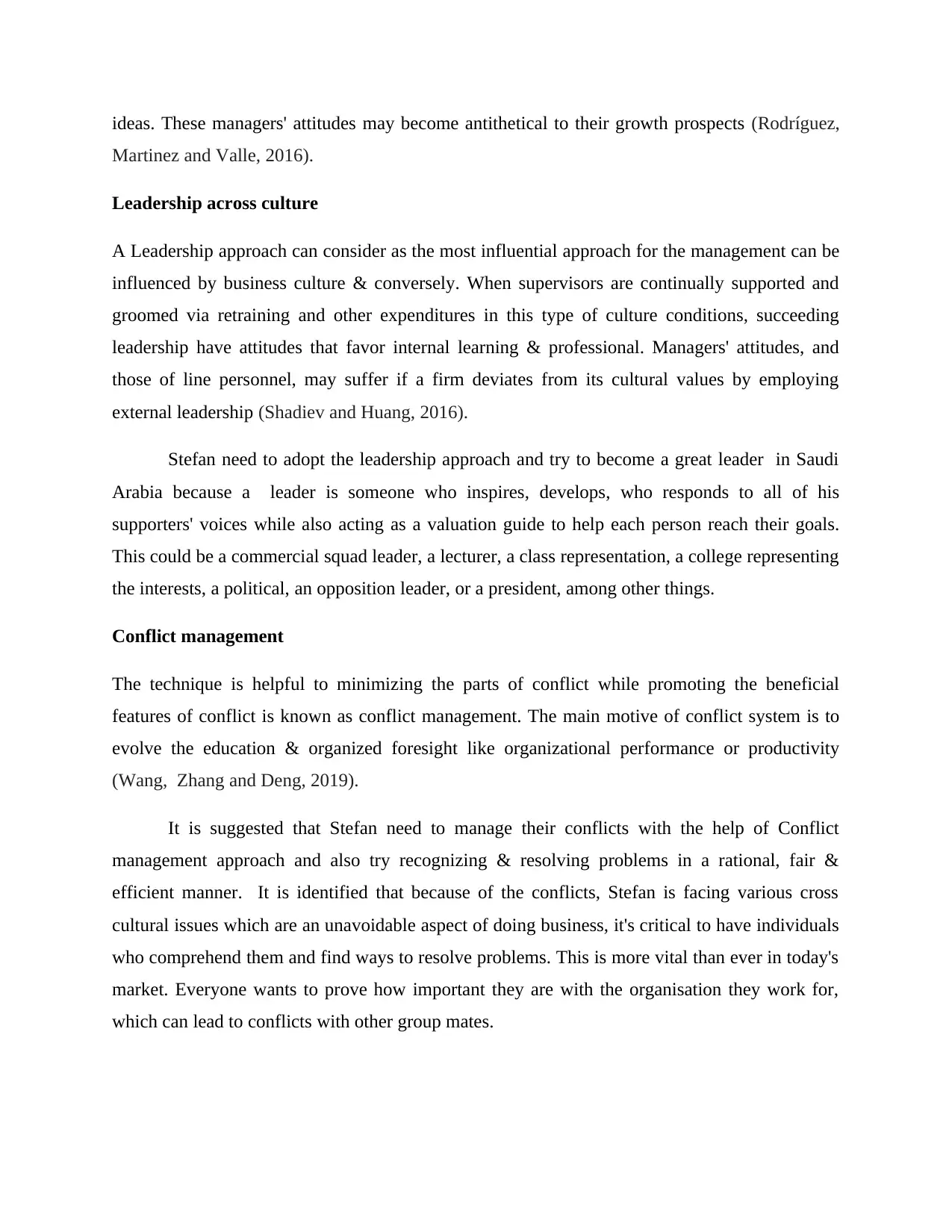
ideas. These managers' attitudes may become antithetical to their growth prospects (Rodríguez,
Martinez and Valle, 2016).
Leadership across culture
A Leadership approach can consider as the most influential approach for the management can be
influenced by business culture & conversely. When supervisors are continually supported and
groomed via retraining and other expenditures in this type of culture conditions, succeeding
leadership have attitudes that favor internal learning & professional. Managers' attitudes, and
those of line personnel, may suffer if a firm deviates from its cultural values by employing
external leadership (Shadiev and Huang, 2016).
Stefan need to adopt the leadership approach and try to become a great leader in Saudi
Arabia because a leader is someone who inspires, develops, who responds to all of his
supporters' voices while also acting as a valuation guide to help each person reach their goals.
This could be a commercial squad leader, a lecturer, a class representation, a college representing
the interests, a political, an opposition leader, or a president, among other things.
Conflict management
The technique is helpful to minimizing the parts of conflict while promoting the beneficial
features of conflict is known as conflict management. The main motive of conflict system is to
evolve the education & organized foresight like organizational performance or productivity
(Wang, Zhang and Deng, 2019).
It is suggested that Stefan need to manage their conflicts with the help of Conflict
management approach and also try recognizing & resolving problems in a rational, fair &
efficient manner. It is identified that because of the conflicts, Stefan is facing various cross
cultural issues which are an unavoidable aspect of doing business, it's critical to have individuals
who comprehend them and find ways to resolve problems. This is more vital than ever in today's
market. Everyone wants to prove how important they are with the organisation they work for,
which can lead to conflicts with other group mates.
Martinez and Valle, 2016).
Leadership across culture
A Leadership approach can consider as the most influential approach for the management can be
influenced by business culture & conversely. When supervisors are continually supported and
groomed via retraining and other expenditures in this type of culture conditions, succeeding
leadership have attitudes that favor internal learning & professional. Managers' attitudes, and
those of line personnel, may suffer if a firm deviates from its cultural values by employing
external leadership (Shadiev and Huang, 2016).
Stefan need to adopt the leadership approach and try to become a great leader in Saudi
Arabia because a leader is someone who inspires, develops, who responds to all of his
supporters' voices while also acting as a valuation guide to help each person reach their goals.
This could be a commercial squad leader, a lecturer, a class representation, a college representing
the interests, a political, an opposition leader, or a president, among other things.
Conflict management
The technique is helpful to minimizing the parts of conflict while promoting the beneficial
features of conflict is known as conflict management. The main motive of conflict system is to
evolve the education & organized foresight like organizational performance or productivity
(Wang, Zhang and Deng, 2019).
It is suggested that Stefan need to manage their conflicts with the help of Conflict
management approach and also try recognizing & resolving problems in a rational, fair &
efficient manner. It is identified that because of the conflicts, Stefan is facing various cross
cultural issues which are an unavoidable aspect of doing business, it's critical to have individuals
who comprehend them and find ways to resolve problems. This is more vital than ever in today's
market. Everyone wants to prove how important they are with the organisation they work for,
which can lead to conflicts with other group mates.
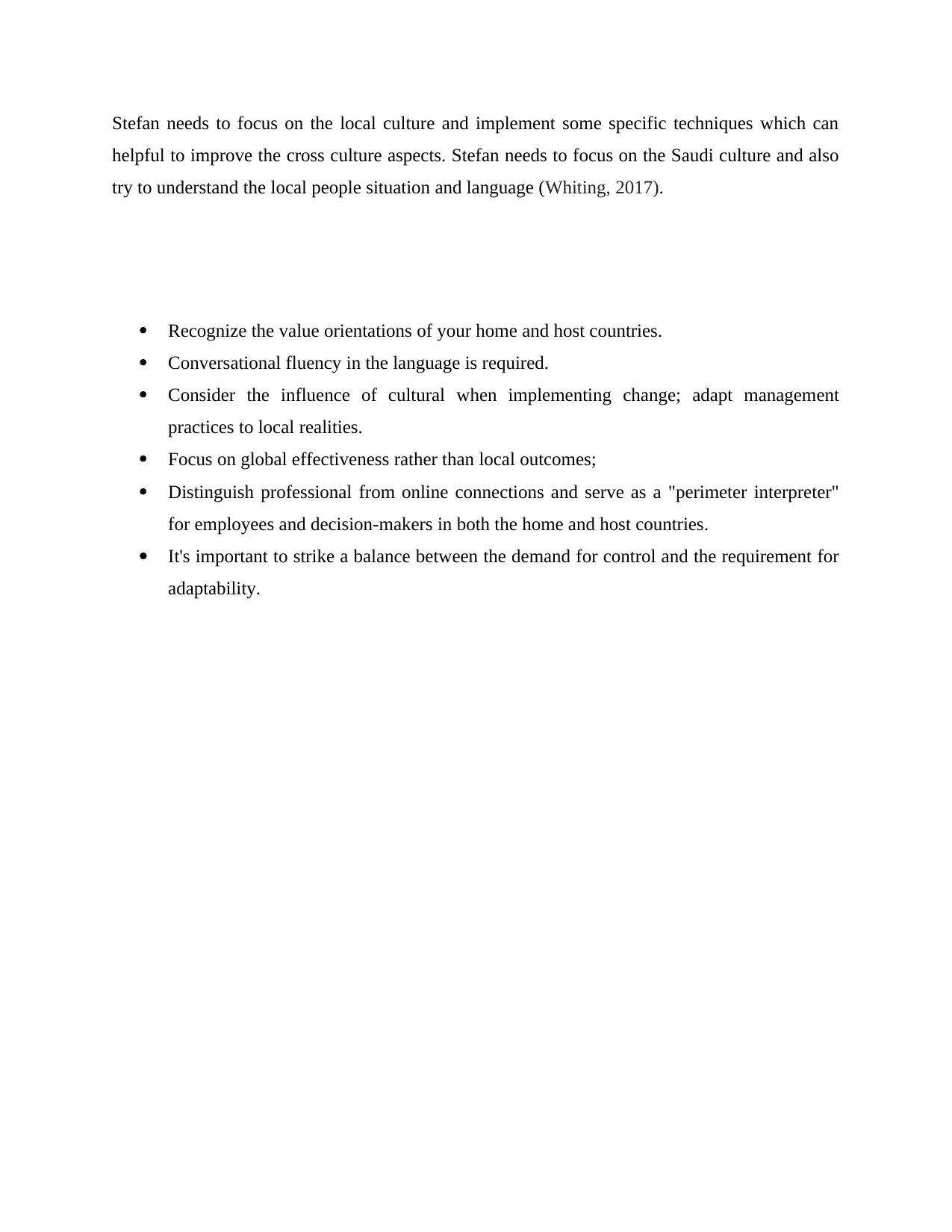
Stefan needs to focus on the local culture and implement some specific techniques which can
helpful to improve the cross culture aspects. Stefan needs to focus on the Saudi culture and also
try to understand the local people situation and language (Whiting, 2017).
Recognize the value orientations of your home and host countries.
Conversational fluency in the language is required.
Consider the influence of cultural when implementing change; adapt management
practices to local realities.
Focus on global effectiveness rather than local outcomes;
Distinguish professional from online connections and serve as a "perimeter interpreter"
for employees and decision-makers in both the home and host countries.
It's important to strike a balance between the demand for control and the requirement for
adaptability.
helpful to improve the cross culture aspects. Stefan needs to focus on the Saudi culture and also
try to understand the local people situation and language (Whiting, 2017).
Recognize the value orientations of your home and host countries.
Conversational fluency in the language is required.
Consider the influence of cultural when implementing change; adapt management
practices to local realities.
Focus on global effectiveness rather than local outcomes;
Distinguish professional from online connections and serve as a "perimeter interpreter"
for employees and decision-makers in both the home and host countries.
It's important to strike a balance between the demand for control and the requirement for
adaptability.
⊘ This is a preview!⊘
Do you want full access?
Subscribe today to unlock all pages.

Trusted by 1+ million students worldwide
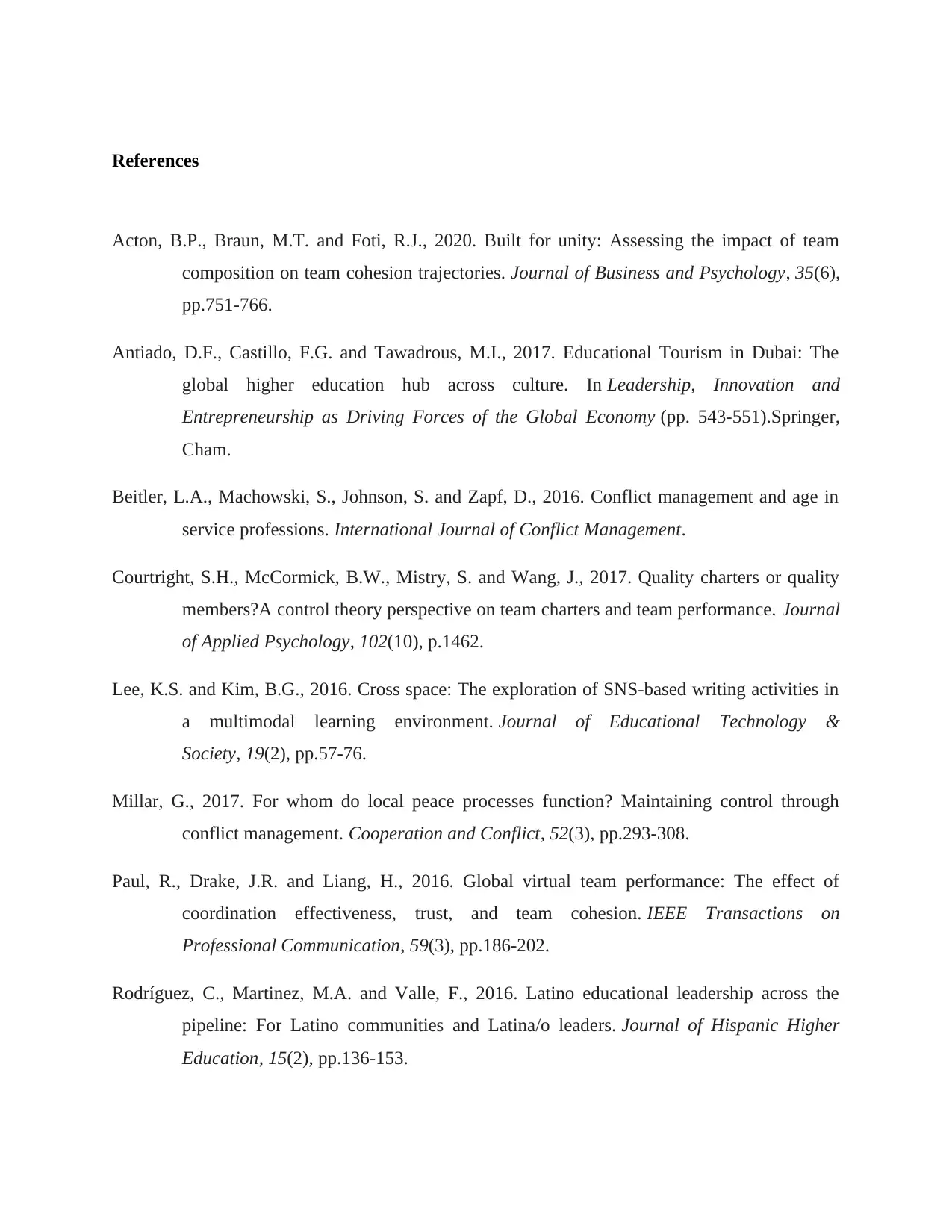
References
Acton, B.P., Braun, M.T. and Foti, R.J., 2020. Built for unity: Assessing the impact of team
composition on team cohesion trajectories. Journal of Business and Psychology, 35(6),
pp.751-766.
Antiado, D.F., Castillo, F.G. and Tawadrous, M.I., 2017. Educational Tourism in Dubai: The
global higher education hub across culture. In Leadership, Innovation and
Entrepreneurship as Driving Forces of the Global Economy (pp. 543-551).Springer,
Cham.
Beitler, L.A., Machowski, S., Johnson, S. and Zapf, D., 2016. Conflict management and age in
service professions. International Journal of Conflict Management.
Courtright, S.H., McCormick, B.W., Mistry, S. and Wang, J., 2017. Quality charters or quality
members?A control theory perspective on team charters and team performance. Journal
of Applied Psychology, 102(10), p.1462.
Lee, K.S. and Kim, B.G., 2016. Cross space: The exploration of SNS-based writing activities in
a multimodal learning environment. Journal of Educational Technology &
Society, 19(2), pp.57-76.
Millar, G., 2017. For whom do local peace processes function? Maintaining control through
conflict management. Cooperation and Conflict, 52(3), pp.293-308.
Paul, R., Drake, J.R. and Liang, H., 2016. Global virtual team performance: The effect of
coordination effectiveness, trust, and team cohesion. IEEE Transactions on
Professional Communication, 59(3), pp.186-202.
Rodríguez, C., Martinez, M.A. and Valle, F., 2016. Latino educational leadership across the
pipeline: For Latino communities and Latina/o leaders. Journal of Hispanic Higher
Education, 15(2), pp.136-153.
Acton, B.P., Braun, M.T. and Foti, R.J., 2020. Built for unity: Assessing the impact of team
composition on team cohesion trajectories. Journal of Business and Psychology, 35(6),
pp.751-766.
Antiado, D.F., Castillo, F.G. and Tawadrous, M.I., 2017. Educational Tourism in Dubai: The
global higher education hub across culture. In Leadership, Innovation and
Entrepreneurship as Driving Forces of the Global Economy (pp. 543-551).Springer,
Cham.
Beitler, L.A., Machowski, S., Johnson, S. and Zapf, D., 2016. Conflict management and age in
service professions. International Journal of Conflict Management.
Courtright, S.H., McCormick, B.W., Mistry, S. and Wang, J., 2017. Quality charters or quality
members?A control theory perspective on team charters and team performance. Journal
of Applied Psychology, 102(10), p.1462.
Lee, K.S. and Kim, B.G., 2016. Cross space: The exploration of SNS-based writing activities in
a multimodal learning environment. Journal of Educational Technology &
Society, 19(2), pp.57-76.
Millar, G., 2017. For whom do local peace processes function? Maintaining control through
conflict management. Cooperation and Conflict, 52(3), pp.293-308.
Paul, R., Drake, J.R. and Liang, H., 2016. Global virtual team performance: The effect of
coordination effectiveness, trust, and team cohesion. IEEE Transactions on
Professional Communication, 59(3), pp.186-202.
Rodríguez, C., Martinez, M.A. and Valle, F., 2016. Latino educational leadership across the
pipeline: For Latino communities and Latina/o leaders. Journal of Hispanic Higher
Education, 15(2), pp.136-153.
Paraphrase This Document
Need a fresh take? Get an instant paraphrase of this document with our AI Paraphraser
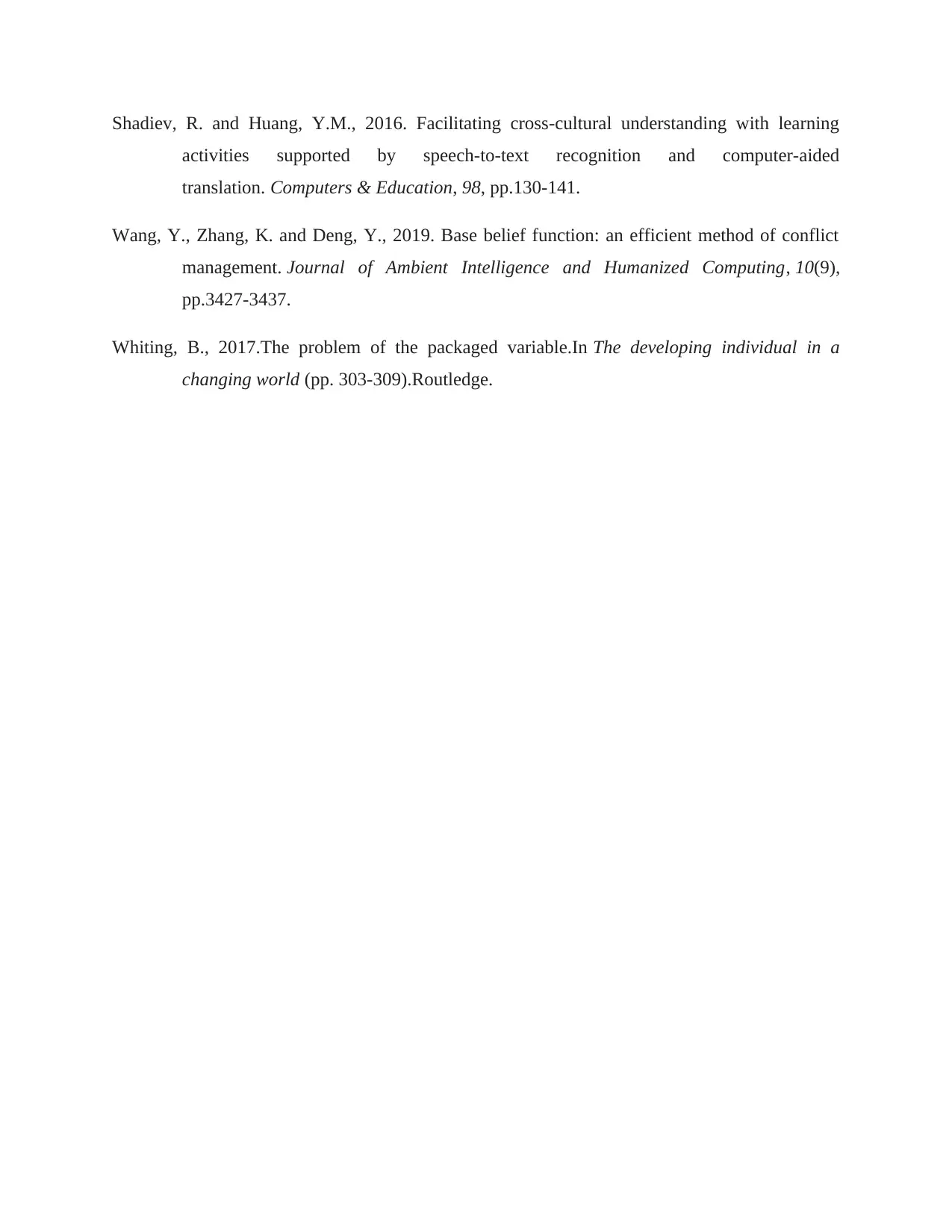
Shadiev, R. and Huang, Y.M., 2016. Facilitating cross-cultural understanding with learning
activities supported by speech-to-text recognition and computer-aided
translation. Computers & Education, 98, pp.130-141.
Wang, Y., Zhang, K. and Deng, Y., 2019. Base belief function: an efficient method of conflict
management. Journal of Ambient Intelligence and Humanized Computing, 10(9),
pp.3427-3437.
Whiting, B., 2017.The problem of the packaged variable.In The developing individual in a
changing world (pp. 303-309).Routledge.
activities supported by speech-to-text recognition and computer-aided
translation. Computers & Education, 98, pp.130-141.
Wang, Y., Zhang, K. and Deng, Y., 2019. Base belief function: an efficient method of conflict
management. Journal of Ambient Intelligence and Humanized Computing, 10(9),
pp.3427-3437.
Whiting, B., 2017.The problem of the packaged variable.In The developing individual in a
changing world (pp. 303-309).Routledge.
1 out of 11
Related Documents
Your All-in-One AI-Powered Toolkit for Academic Success.
+13062052269
info@desklib.com
Available 24*7 on WhatsApp / Email
![[object Object]](/_next/static/media/star-bottom.7253800d.svg)
Unlock your academic potential
Copyright © 2020–2026 A2Z Services. All Rights Reserved. Developed and managed by ZUCOL.





